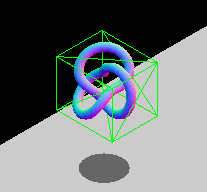Struct kdtree_ray::AABB
source · pub struct AABB {
pub min: Vector3<f32>,
pub max: Vector3<f32>,
}Expand description
Axis-aligned bounding box is defined by two positions.
Note: The first position is expected to be the minimum bound and the second the maximum bound.
The animated GIF below shows a graphic example of an AABB that adapts its size to fit the rotating entity. The box constantly changes dimensions to snugly fit the entity contained inside.

Fields§
§min: Vector3<f32>Minimum position
max: Vector3<f32>Maximum position
Implementations§
Trait Implementations§
Auto Trait Implementations§
impl RefUnwindSafe for AABB
impl Send for AABB
impl Sync for AABB
impl Unpin for AABB
impl UnwindSafe for AABB
Blanket Implementations§
source§impl<T> BorrowMut<T> for Twhere
T: ?Sized,
impl<T> BorrowMut<T> for Twhere
T: ?Sized,
source§fn borrow_mut(&mut self) -> &mut T
fn borrow_mut(&mut self) -> &mut T
Mutably borrows from an owned value. Read more